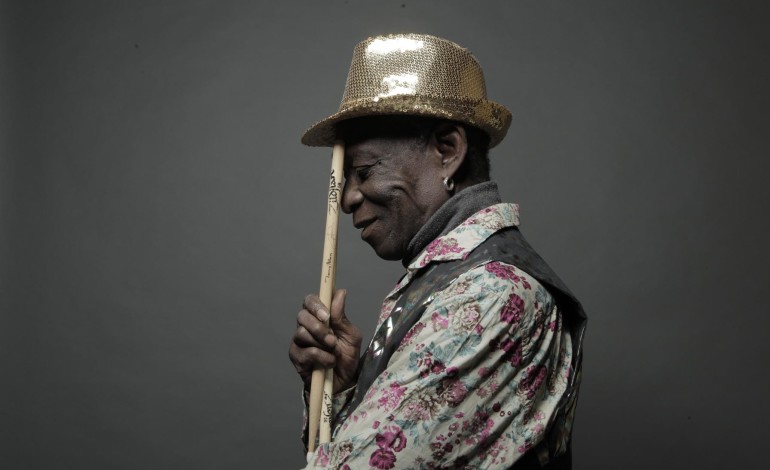
Tony Oladipo Allen – afrobeat innovator and longtime Fela Kuti collaborator – has died at the age of 79. Despite his advanced years, his death comes as a shock to those who knew him, with his manager Eric Trosset describing the musician as being “in great shape”. Allen was still performing and recording new music right up to his death; later this year he was set to release an album of material recorded in 2018 with the late Hugh Masekela.
Trosset told Agence France-Presse he had spoken with Allen only a few hours before he fell suddenly ill and was admitted into the Pompidou Hospital in Paris, where he later passed away having suffered from an abdominal aortic aneurysm. Trosset confirmed the cause of death was not linked to the coronavirus.
Among the many musical legacies Allen leaves behind, his most famous is as the drummer and musical director for Africa ’70, a collective of Nigerian musicians spearheaded by bandleader Fela Kuti. Born in Lagos in 1940, Allen taught himself to play the drums when he was 18 by listening to the jazz records of Art Blakely and Max Roach. After performing for several bands, Allen was invited to join Fela’s group Koola Lobitos in 1964, which would later be renamed Africa ’70. Over the next fifteen years, the two would go on to record over thirty albums together that pioneered ‘afrobeat’, a music genre fusing the Yoruba rhythms of West African Jùjú with American jazz and funk.
REST IN POWER AND JOURNEY WELL ANCESTOR TONY ALLEN pic.twitter.com/4fYxgsdwrO
— Seun Anikulapo Kuti (@RealSeunKuti) May 1, 2020
Afrobeat is often mistakenly credited with being Fela’s sole creation, though in truth it was Allen’s incorporation American and African drumming techniques – coupled with an uncanny ability to play in several time signatures at once – that proved a defining aspect of the genre’s sound. As Fela himself once said “without Tony Allen, there would be no afrobeat”. Following Allen’s departure from the band in 1979 owing to disputes over royalties, Africa ’70 lost its vitality, releasing only two more albums. Before dissolving the group entirely, Fela had hired four separate drummers to try to fill the void Allen had left behind.
View this post on Instagram
The epic Tony Allen, one of the greatest drummers to ever walk this earth has left us. What a wildman, with a massive, kind and free heart and the deepest one-of-a-kind groove. Fela Kuti did not invent afrobeat, Fela and Tony birthed it together. Without Tony Allen there is NO afrobeat. I was lucky enough to spend many an hour with him, holed up in a London studio, jamming the days away. It was fucking heavenly. He was and still is, my hero. I wanted to honor his greatness so much when we played together, and I was nervous when we started, but he made me laugh like a two year old, and we fell right into pocket. I lit up like a Christmas tree every time I knew we were about to lay down some rhythm. With Tony’s longtime musical collaborator, friend and champion, Damon Albarn, we jammed til the cows came home. We partied in Nigeria, we partied around Europe, and it was always about the music. Just grooving high, grooving deep. Tony Allen I love you, I’m so grateful to have had the chance to rock with you. God bless your beautiful soul. A post shared by Flea (@flea333) on
Despite Fela garnering attention for his uncompromising approach to recording and notable anti-authoritarian dissidence, Allen was widely considered an icon in his own right both at home and abroad. His polyphonic rhythms caught the attention of Brian Eno, who used Allen’s playstyle as a template for the production on Talking Heads’ Remain In Light. Allen was, in Eno’s words, “perhaps the greatest drummer who has ever lived”, a sentiment echoed in a tribute posted today by Red Hot Chili Peppers’ bassist Flea.
Flea and Allen were both members of the supergroup Rocket Juice & The Moon, along with frequent collaborator Damon Albarn. After Albarn, a lifelong fan of the drummer, sang “Tony Allen really got me dancing” on the Blur song “Music Is My Radar” in 2000, the two sparked a friendship, later forming The Good, The Bad & The Queen with The Clash’s Paul Simonon and The Verve’s Simon Tong. The group released their self-titled debut in 2007 to critical acclaim, and reunited for its follow-up Merrie Land a decade later. Watch this video from May 2019 of their performance at Le Trianon, Paris in support of the album’s tour:
